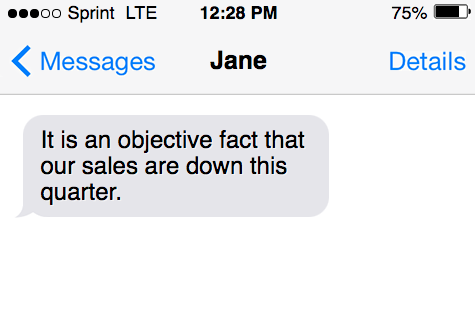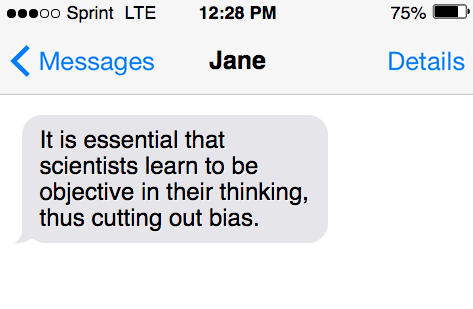Subjective vs. objective—what is subjective information? And what is objective information? How do they differ? And what are the various uses for each of these types of data points?
Learn the difference between subjective vs. objective in this worksheet…
What makes something subjective?
Subjective is that which is subject to the perceptions of the observer.
Anything resulting from opinions, feelings, thoughts, and other unquantifiable perceptions is called subjective.
When most people think of how they felt during a sunset or what their favorite colors are, these are all subjective opinions.
They are open to bias, too, meaning prejudice against a particular group or thing.
For example, most people may not even think about their favorite number, but gamblers often are biased against the number 13, as it is thought to be unlucky. This is subjective.
Subjective data, thoughts, opinions, etc are used everywhere. From describing symptoms to the doctor to creating content that people like, subjective opinions color every aspect of our life and are used to run the world itself. Psychologists use subjective data to create manuals.
Conglomerates use it to create products that people will buy, among others. It is also an unconscious part of our daily lives. Subjective thoughts are how we decide what we want to eat, how we want to dress, who we want to be friends with, and more.

What makes something objective?
Something is made objective when it can be quantified and factual. There are no interpretations, opinions, or thoughts involved in the creation of anything that is objective.
Thus, the sun rising in the east is an objective fact. It is observable and doesn’t require anyone to assume or opine anything.
Objective, or hard data, is used in every field to create a mine of reliable data. It also takes out the possibility of bias since that can blind researchers and businesses to the reality of things.
For example, women could be buying more razors than men, but due to bias, a company may advertise men-only razors.
However, objective studies can rectify that, since a quantifiable number of sales would provide a bigger picture without human bias.

Difference between subjective and objective
Simply put, subjective is based on someone’s interpretation of things or events. On the other hand, the objective is that which does not require emotional interpretations.
This means that the sun rising in the east is an objective fact. It does not require people to think about or interpret it. We see it rising every day on the same side of the Earth.
However, whether the sun rising is beautiful or not is subjective and open to interpretation.
It can also change from person to person, even if they observe the same sunrise.
One may say that it is the most beautiful sunrise they have ever seen, while another may feel that sunsets are more beautiful. This is subjective.
However, no human can deny that the sun truly is rising where it always rises. This is objective.
Key differences
The difference between subjective and objective makes data with both that much better. For example, explaining how you feel to the doctor is subjective. Different people will define the same symptoms differently. However, an MRI scan presents quantifiable, objective data.
Putting the two together is how doctors decide which brand of medication to give, how strong it can be, or how frequently it needs to be taken. They may also decide on extraneous support systems based on both kinds of information that they collected.
Sentence examples of something subjective
These are examples of how to use the word “subjective” and of things that are subjective in nature:
1. The opinions in this paper are subjective and are based on lived experiences of women around the world.
2. This article reflects the subjective views of the author himself, and the newspaper is not liable for any such opinions or thoughts.
Sentence examples of something objective
These are examples of how to use the word “objective.” And referring to things that are objective in nature:
1. It is essential that scientists learn to be objective in their thinking, thus cutting out bias.
2. It is an objective fact that our sales are down this quarter.
Is morality “objective” or “subjective”
The Stanford Encyclopedia of Philosophy describes morality as a normative code of conduct decided by society. These codes of conduct are also expected to be followed by all rational people in particular circumstances.
This idea of morality changes when the social structures change and context changes, and is highly susceptible to interpretation. In many instances, morality may look objective, but in most cases, it is highly subjective.
What makes “data” subjective or objective
What makes data subject or objective?
Subjective
The subjective way of collecting data means collecting people’s experiences. Or interactions with a sample group. For example, asking a particular group of people if they were happy growing up in their birth country is a collection of subjective data. This is because each person will have different thoughts.
The parenting they had, the area they lived in, their financial positions, and more—all go into creating people’s idea of happiness and are therefore subjective.
Subjective data is an important part of data collection because it can understand how people look at the world. These perspectives are critical in the medical field, administration, politics, psychology, and more.
Objective
Objective data, on the other hand, is data that is quantifiable and factual. It depends not on how a demographic feels about something but how things that can be verified. To understand this, let’s continue with the same example from above.
For the group being asked how happy they were, objective data collection would include facts like which country they were born in, their financial conditions, etc. This quantifiable data allows data collectors to create a true-to-life snapshot of the situation they want to know more about. It allows researchers to eliminate bias, too.
How are subjective and objective used in the medical field?
Both subjective and objective data are essential in the medical field. Ideally, doctors and nurses would gather subjective data, then follow up with objective observations and test results.
Subjective data or observations would include things that the patient feels or the symptoms they report having.
Thus someone can say that they are itching all over their body. That would be subjective data. This is because the itching could be somewhere specific or a hallucination, but the patient feels like it is everywhere.
A nurse or physician
The nurse or physician will follow up with a health check. And signs like rashes, red skin, lesions, etc. are recorded as objective data. Any follow-up tests ordered due to the subjective reports (made by patients) are also recorded as objective data.
This is why a patient’s medical report is always seen as subjective and objective, even if they say the same thing as the other medical professionals.
For example, someone may have a rash on their arm. The health professional seeing it and noting it as a rash becomes objective. And the patient’s feeling of it becomes subjective.
Correlating both the objective and subjective gives health professionals a clearer understanding of a patient’s medical history, how they are suffering, and how to treat them better.
How to use “subjective” and “objective”
How to use subjective and objective writing.
Tips on how to remember which is which
One easy way to remember the meaning of the word “subjective” is to understand that anything subjective is “subject to” interpretation. You can also think of the word “subject” in the sense of subjects we study at school, and create a mental association with that. Subjects are varying, and vast, and encompass a lot of things that we will study.
In the same way, subjective opinions or thoughts can vary. Wherever there is the chance of opinions or varying degrees of thoughts or feelings, that is subjective.
For example, a subject cannot be seen or felt, but it is an important part of our education.
Conversely, “objective” can be associated with the word “object”. An object is a quantifiable thing that can be felt, touched, and whose existence is undeniable.
In the same way, anything that is “objective” is undeniable, factual, and quantifiable. Facts like the sun rising, gravity, etc. are undeniable facts, the effects of which can be seen or felt.
These are not open to interpretations and can be proved. Usually, without human bias.
Tips on how to use them
The way to use the words “subjective” and “objective” can vary depending on the context. Grammatically, they are both adjectives. This means that they describe something. The word “subjective” describes how something is open to interpretation.
Contrastingly, the word “objective” describes that which is hard fact and is not open to interpretation.
For example, something is “an objective observation” or “a subjective opinion.” The words usually come before the noun it is describing.
However, the words can also be used as adverbs by adding “ly” to them. For example, “objectively” or “subjectively” become adverbs.
Sources
- Comparison of Objective and Subjective Methods on … – ERIC
- (PDF) The Subjective and the Objective – ResearchGate
- Perception of Question Subjectivity in Social Q&A
- Subjective or Objective? How Objective Measures Relate to
Inside this article
Fact checked:
Content is rigorously reviewed by a team of qualified and experienced fact checkers. Fact checkers review articles for factual accuracy, relevance, and timeliness. Learn more.
Core lessons
Glossary
- Abstract Noun
- Accusative Case
- Anecdote
- Antonym
- Active Sentence
- Adverb
- Adjective
- Allegory
- Alliteration
- Adjective Clause
- Adjective Phrase
- Ampersand
- Anastrophe
- Adverbial Clause
- Appositive Phrase
- Clause
- Compound Adjective
- Complex Sentence
- Compound Words
- Compound Predicate
- Common Noun
- Comparative Adjective
- Comparative and Superlative
- Compound Noun
- Compound Subject
- Compound Sentence
- Copular Verb
- Collective Noun
- Colloquialism
- Conciseness
- Consonance
- Conditional
- Concrete Noun
- Conjunction
- Conjugation
- Conditional Sentence
- Comma Splice
- Correlative Conjunction
- Coordinating Conjunction
- Coordinate Adjective
- Cumulative Adjective
- Dative Case
- Determiner
- Declarative Sentence
- Declarative Statement
- Direct Object Pronoun
- Direct Object
- Diction
- Diphthong
- Dangling Modifier
- Demonstrative Pronoun
- Demonstrative Adjective
- Direct Characterization
- Definite Article
- Doublespeak
- False Dilemma Fallacy
- Future Perfect Progressive
- Future Simple
- Future Perfect Continuous
- Future Perfect
- First Conditional
- Irregular Adjective
- Irregular Verb
- Imperative Sentence
- Indefinite Article
- Intransitive Verb
- Introductory Phrase
- Indefinite Pronoun
- Indirect Characterization
- Interrogative Sentence
- Intensive Pronoun
- Inanimate Object
- Indefinite Tense
- Infinitive Phrase
- Interjection
- Intensifier
- Infinitive
- Indicative Mood
- Participle
- Parallelism
- Prepositional Phrase
- Past Simple Tense
- Past Continuous Tense
- Past Perfect Tense
- Past Progressive Tense
- Present Simple Tense
- Present Perfect Tense
- Personal Pronoun
- Personification
- Persuasive Writing
- Parallel Structure
- Phrasal Verb
- Predicate Adjective
- Predicate Nominative
- Phonetic Language
- Plural Noun
- Punctuation
- Punctuation Marks
- Preposition
- Preposition of Place
- Parts of Speech
- Possessive Adjective
- Possessive Determiner
- Possessive Case
- Possessive Noun
- Proper Adjective
- Proper Noun
- Present Participle
- Prefix
- Predicate



